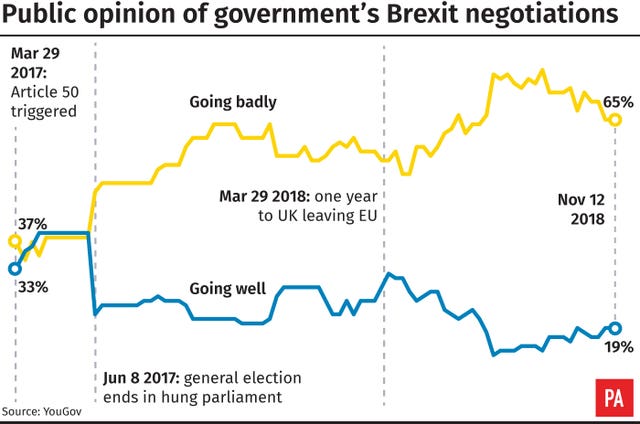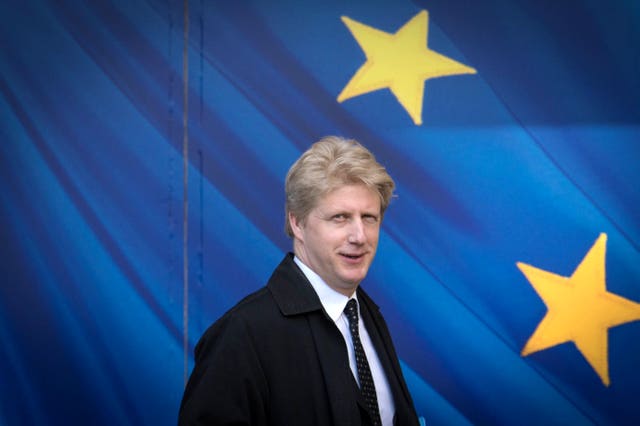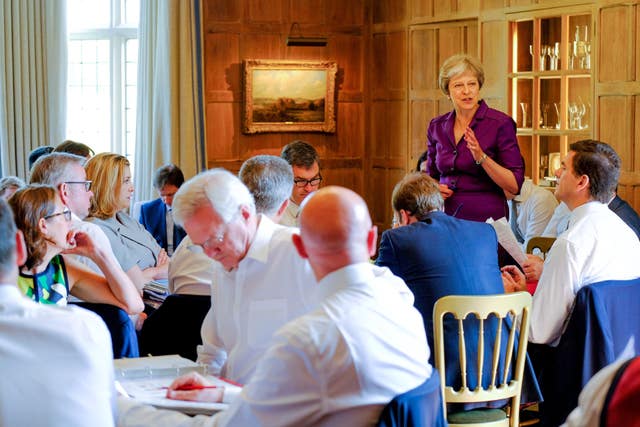
Brexit negotiations remain deadlocked over measures to prevent a hard border between the UK and Ireland.
Officials from both sides were engaged in talks which began on Sunday and lasted until 2.45am on Monday but failed to produce a decisive breakthrough.
Downing Street said that there were “substantial issues still to be overcome” in relation to the “backstop” measure aimed at ensuring the frontier between Northern Ireland and Ireland remains much the same as it is now no matter what happens in the wider Brexit trade deal.
The Prime Minister’s official spokesman said: “We have made good progress in the negotiations in relation to the withdrawal agreement but there are substantial issues still to be overcome in relation to the Northern Irish backstop.”
Brussels’ chief negotiator Michel Barnier told ministers from the 27 remaining EU nations at a meeting of the general affairs council that key issues remained unresolved.
The European Council released a statement to say: “Michel Barnier explained that intense negotiating efforts continue, but an agreement has not been reached yet.
“Some key issues remain under discussion, in particular a solution to avoid a hard border between Ireland and Northern Ireland.”
A spokesman for Mr Barnier declined to comment on a report in the Financial Times suggesting he had told the EU27 ministers that “the parameters of a possible agreement are very largely defined”.
The FT reported an unnamed witness to the meeting as saying that Mr Barnier had told the ministers: “As of this moment, this agreement is still not reached. As in any negotiation, the final stretch is always the most difficult.
“On the basis of our common efforts, the parameters of a possible agreement are very largely defined. On the British side, the Cabinet will meet tomorrow to examine these parameters.”

But Ireland’s deputy prime minister Simon Coveney told reporters in Brussels said there was “still clearly work to do” to reach an agreement.
“Clearly this is a very important week for Brexit negotiations,” said Mr Coveney.
And a senior Brussels source said that work was “ongoing”, adding: “We’re not there yet.”
Germany’s Europe minister Michael Roth said: “We all know the clock is ticking and we must now come to a good outcome. We don’t have much time left.”
His French counterpart Nathalie Loiseau said: “The ball is in the British court. It is a question of a British political decision.”
EU27 were informed by @MichelBarnier on the ongoing #Brexit negotiations. Intense negotiating efforts continue, but an agreement has not been reached yet. https://t.co/wbtTkdLQSP
See in the pic the representatives present at the meeting pic.twitter.com/62mzLGoZZi
— EU Arauzo (@EU_Arauzo) November 12, 2018
A key sticking point is Mrs May’s call for a UK-wide backstop measure rather than the Northern Ireland-only provision proposed by the EU.
The lack of decisive progress in Brussels came as Mrs May’s domestic position appeared even more difficult.
Further details of the crunch Chequers meeting in July revealed a series of ministers voiced concerns about her strategy before ultimately supporting it.
Home Secretary Sajid Javid, Defence Secretary Gavin Williamson and Chancellor Philip Hammond were among Remain-supporting ministers who raised concerns about the Chequers plan, the BBC reported.
Mr Javid described the proposal for a common rule book with the EU for goods and agriculture as “very worrying”, while Mr Hammond questioned whether the 27 other countries in the union would accept such a plan, the broadcaster said.
Good meeting with @MichelBarnier this morning – crucial week for #BREXIT – negotiating teams engaging intensively, more work still to be done. Solidarity across the EU remains very strong. @HMcEntee @dfatirl pic.twitter.com/3dPA2GwlLL
— Simon Coveney (@simoncoveney) November 12, 2018
Meanwhile International Development Secretary Penny Mordaunt, who has not given wholehearted public support to the Chequers strategy, suggested the Cabinet would act as a “check” on the Prime Minister.
The Brexiteer told Sky News: “The important thing is that there are two checks on this deal – there is Cabinet and there is Parliament.
“Cabinet’s job is to put something to Parliament that is going to deliver on the referendum result.”
The Prime Minister’s spokesman said: “The Cabinet has backed the Prime Minister in moving forward with her negotiations with the EU and I expect Cabinet will continue to do so.”
Former transport minister Jo Johnson said he decided to quit Mrs May’s Government last week because he was concerned at reports she was planning a publicity campaign which he said amounted to a “calculated deceit”.
Reports suggested the campaign would compare the content of any deal secured by Mrs May with the prospect of a chaotic no-deal withdrawal, rather than comparing it to the UK’s current situation as an EU member.

“I challenge the Government to come clean on the cost of Brexit,” he told the Evening Standard.
“The reason they can’t look us in the eye, it’s because they know this will leave us worse-off and with less control. It’s a gross abuse of civil service impartiality.”
Mr Johnson added: “There is a sea-change in mood among my Conservative colleagues who are focused by this crisis. I would not be surprised if more colleagues in senior positions speak out.”
His brother, former foreign secretary Boris Johnson, claimed Mrs May is on the brink of “total surrender” to the EU over Brexit as he urged the Cabinet to mutiny against the Prime Minister’s withdrawal agenda.

“The awful truth is that even if the Cabinet mutinies – as they ought – it will make little difference,” he said in his Daily Telegraph column.
“Even if we agree with the EU that the UK must have a unilateral break clause, so that we can go our own sweet way at a time of our own choosing, it is irrelevant because the programme and ambition of the Government is to remain in captivity, to stay in our cell, even if we are given the theoretical key to escape.”
Former culture secretary John Whittingdale said Mrs May would have to go if she could not get a Brexit deal through the Commons.
He told BBC Radio 4’s The Westminster Hour: “I think if the Prime Minister’s Brexit plan doesn’t get through Parliament, I think it’s quite difficult to see how the Prime Minister can continue because she has staked her credibility.”


Comments: Our rules
We want our comments to be a lively and valuable part of our community - a place where readers can debate and engage with the most important local issues. The ability to comment on our stories is a privilege, not a right, however, and that privilege may be withdrawn if it is abused or misused.
Please report any comments that break our rules.
Read the rules hereLast Updated:
Report this comment Cancel